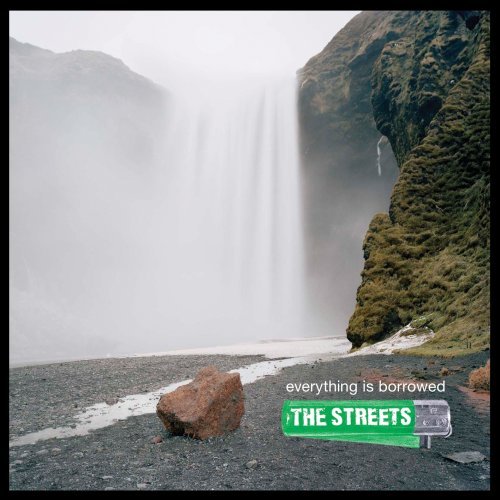
The Streets
Everything Is Borrowed
(Sixsevennine; 2008)
By George Bass | 15 September 2008
Mike Skinner’s been to the tailors again, and this time they’ve gone all ascetic on his wardrobe. From the Reebok runaround of Original Pirate Material (2002) through to A Grand Don’t Come For Free‘s (2004) dark Adidas, the UK’s most eloquent yobbo proved time and time again he could gather the rhythms of the inner city catwalks and weave them into polyester tapestries. Unfortunately, by the time he’d upgraded to Prada on The Hardest Way To Make An Easy Living (2006) he’d got somewhat sidetracked, apparently more concerned with bragging about which diva he’d washed rock with than mining the alleyways for fresh beats. Having gorged mightily on the lows of celebrity excess, something was bound to give—either his assets, his waistline, or his marbles. I still can’t work out which one’s the less messy option, but Skinner’s course of action and this resultant essay on redemption is a mixed bag unlike any other. And it’s not even cut from man-made fibres.
Everything Is Borrowed sees Skinner using his two year new album appointment to escape from disheveled bling into a fresh hessian tranquility—at least that was the buzz on the relevant blogs in the build-up to the inevitable leak. Could this really be his born-again, robinsonade record? The one where we find him bearded and living in a wigwam, cleansed of his western vices like Charlie Sheen at the start of Hot Shots? Not exactly, but there’s certainly a filtered clarity to the album, especially when compared to the deluxe din of its more jagged predecessor. It’s just a shame that the whole thing’s haunted by strong wafts of cheese; this just in: Skinner’s determination to remain happy for thirty-nine minutes and his shedding of the chirpy geezerisms prove to be something of his undoing. He’s already declared he’s poured blood, sweat, and tears into the making of this record, but these days that’s a little like saying the Boston Strangler’s dead set on making this the best Christmas ever.
The new concept’s a simple enough one: write eleven Streets songs that sound not much like the Streets, and carry the green torch while you’re doing it. In places, surprisingly, it truly works: the acid funk of “The Sherry End,” a beer-clinking toast to the highs of male friendship, bounces like it’s high on Gummiberry Juice, determined to pull you along for the adventure. Likewise, the title track, which howls gamely into life at the start of the album, flashes bright summer lightning as an organ loop carries Skinner into sunny reflection. When he hits the mark, his gnarly grey energy is converted successfully into a kind of strutting Buddhism intended to function as the core of the new LP. Now I’m all for a little more philanthropy, but really, when it involves instances more embarrassing than a New Age flowchart adapted for PowerPoint, it’s time to politely fidget and check out. “The Strongest Person I Know” is preciously pirouetting twee, the kind of thing that would’ve died in a stampede of garage if it were inserted into his debut. Its intentions are fair enough—using harps to salute the integrity of Skinner’s soul mate—but come on, huggy lullabies? The Streets?
Having said that, though, I can’t deny it isn’t nice to hear something close to believably optimistic on mainstream radio, no matter how blinkered it becomes at times. “On The Flip Of A Coin” might jangle like a broken sitcom theme, but in terms of content, it’s got a creepy sense of fate, even doom, following a boy forced to confront his fears on the whim of a tossed tuppence (watch your back, Aaron Eckhart). Similarly, the raucous pop of “Heaven For The Weather” is infectious enough, packing gospel jollies and Super Mario FX into a barter with Beelzebub himself. “I want to go to Heaven for the weather / Hell for the company,” yells Skinner during the chorus, his Mockney-Birmingham hybrid helping cement the plucky everyman factor. It’s when he tries to sell the “Skinner as sage” shtick that things start to wobble. There’s a bizarre moment in the whisky-sloshing lounge of “I Love You More (Than You Like Me)”—which has Mikey berating the time he spent doing a drawing of a girl who binned him, then realised the drawing was shit and decided to stop doing the drawing—that veers so deep into Dan Treacy badlands that even Phileas Fogg couldn’t rescue him. And as for the scripture hiccups of “Alleged Legends,” where he tries tackling the thorny issue of religion’s validity in the 21st century…well, the Bloodhound Gang managed to do it much better on “Hell Yeah,” and they were meant to be dicking around.
Many fans might have trouble accepting the Streets’ fourth album as canon, if only because it sounds so vehemently against type. There’s a brilliant EP lurking somewhere in this record, but Mike Skinner is either too ambitious or too fatigued to rescue it. It’s a shame to see an MC once heralded as a modern-day Chaucer stumble almost to the point of slapstick, but, like Linus Roache said in Batman Begins, perhaps what he’s really doing is learning how to pick himself up. What he should keep in mind, however, is that redemption isn’t often to be found by following signs with “Redemption” written on them.





